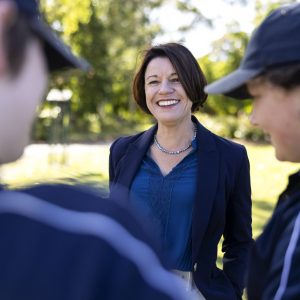Published on October 25, 2024
Nobel Peace Prize winner Desmond Tutu puts it simply:
“In Africa when you ask someone ‘How are you?’ the reply you get is in the plural even when you are speaking to one person. A man would say, ‘We are well’ or ‘We are not well.’ He himself may be quite well, but his grandmother is not well and so he is not well either. . . . The solitary, isolated human being is really a contradiction in terms.” (source)
This is a quotation from Jack Kornfield’s book The Wise Heart. As a Buddhist thinker and philosopher, Kornfield writes often about the interconnectedness of us all – our interconnection with each other and the planet. From this perspective, one action we take can reverberate in ways we may not anticipate – like a rock thrown into the water: the rings spiral out beautifully and also disrupt the calm surface of the water. Walking slowly and gently – taking the time to pause and reflect before acting or speaking – become essential life skills in an interconnected world that as they enable us to anticipate potential consequences and evaluate our level of comfort with them.
This is an essential competency to develop in our students because, as Desmond Tutu states, “the solitary isolated human being is really a contradiction in terms”. We are not isolated from each other. The reverberations of the war in the Middle East or the Ukraine are felt by all of us in an interconnected economy. COVID taught us that global pandemics are a real thing, and we are waiting with bated breath the outcome of the US Presidential elections because we know it has the potential to shape geo-political relations across the globe. Social media – our lives and our children’s lives online – are a testament to our interconnectedness and how one mistake can have far reaching consequences that live with us forever.
The sense of interconnectedness is also a source of hope and affirmation. It is a reminder that we are never alone and that we have the potential to work together to solve the wicked problems we encounter.
In Theory of Knowledge (TOK), one of the IB Diploma courses, we explore the nature of knowledge and how we know what we know. We unpack the way in which knowledge is constructed in different disciplines of study and how their claims to truth are given validity. For example, we compare the scientific methodology and the claim to rationality underpinning it, with the way in which an artist constructs knowledge and meaning and debate the place of creativity in science and rationality in the arts. We also consider the differences and similarities between the construction of knowledge across different knowledge systems, including indigenous knowledge systems.
The concept of interconnection is central to many indigenous knowledge systems. In Australia, Aboriginal and Torres Strait Islander communities talk about “care of country”; there is a spiritual connection to the land and with it a responsibility to look after what gives us sustenance and respect all beings for what they bring to the world. The example provided by Desmond Tutu above articulates a belief that if you are not well, I am not well and cultivates a sense of empathy and compassion. If we are interconnected, then we want to help each other. If one member of the community is suffering, we all suffer in some way, and this creates the imperative to treat or help others in the way in which we would want to be treated or helped.

School communities are microcosms of the world. If we can help our students understand their interconnection, and understand that different cultures value or privilege different ways of knowing or experiencing the world (a key element of TOK and all the IB Programmes), then we are helping young people become adults who are compassionate and who seek to care for and serve others as much as themselves. In so doing, we also cultivate that spirit of curiosity – the inquisitiveness about other cultures whose histories, beliefs and ways of being in the world are different to our own. Despite these differences, though, we all have a responsibility to be mindful of the rocks we through into the pond, the ripples they generate and the impact they will have on others.
Our students need core knowledge and skills – they need to be highly literate and numerate – but they need from us much more than this if we want to ensure the world and our beautiful country is one characterised by peace, harmony, care for country and care for others as well as ourselves. They need to be reflective, kind, curious, compassionate and deep thinkers who seek to question and seek to connect. It is this imperative that drives me as an educator – that strong sense of purpose that our work is so very important for ourselves, our country and our world.

